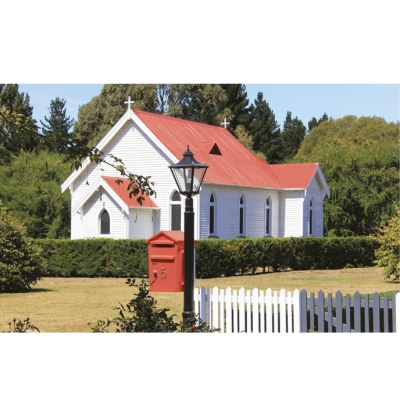Isaac Conservation Trust
 Church: St Ita’s built 1911, came from Hinds in five pieces then fully restored on site.
Catherine Ott
Church: St Ita’s built 1911, came from Hinds in five pieces then fully restored on site.
Catherine Ott
The Isaac Conservation and
Wildlife Trust
The Isaac Conservation and Wildlife Trust, established in 1977 continues the land rehabilitation and conservation work of Sir Neil and Lady Diana Isaac.
The Trust is self-funding and does not solicit for monies. It is the assets, bequeathed to the Trust from Sir Neil and Lady Isaac that provide the income to continue their philanthropic contribution to conservation.
The main focuses are the conservation of endangered native flora and fauna, the conservation of heritage buildings and the study of conservation through education and research. This study of conservation and the environment is embodied by funding two post graduate scholarships annually, at both Canterbury and Lincoln Universities.
Specialised captive breeding of New Zealand native birds, reptiles and fish, with the aim of reintroduction into the wild, is carried out to stabilise and reverse declines in at-risk species. The Trust currently holds New Zealand shore plover, orange-fronted parakeet, red-crowned parakeet, black stilt,
blue duck, brown teal, Cook Strait tuatara, grand skink, Otago skink and Canterbury mudfish.
The Trust also breeds Cape Barren geese and mute swan, which are donated to Ducks Unlimited New Zealand.
The Trust has decades of animal husbandry and captive breeding experience, specialising in New Zealand species on the brink of a high threat status. This area of the Isaac Conservation Park is off limits to the public due to the fragility of its inhabitants.
Lady Isaac was not just a wildlife conservationist, but also a conservationist of historic buildings. The development of the Isaac Heritage Village is comprised of 14 relocated historic Canterbury buildings.
Many of these unique and irreplaceable buildings (c.1860 to 1940), were threatened with demolition. The Heritage Village will eventually be open to the public. Revegetation of plants on the Isaac Conservation Park land includes a focus on the restoration of the Otukaikino River, feeding into the Waimakariri River. To date the Trust has fenced off waterways from stock, extensively cleared weeds, and planted over 45,000 eco-sourced natives. Along the corridor of native plants that now line the river, land has been set aside to provide a public walkway.
The Trust has been set up to exist in perpetuity to provide a benchmark in conservation, continuing the legacy of Sir Neil and Lady Isaac.
Catherine Ott
Image Gallery
https://ducks.org.nz/flight-magazine/item/55-isaac-conservation-trust#sigProId029e011c04

